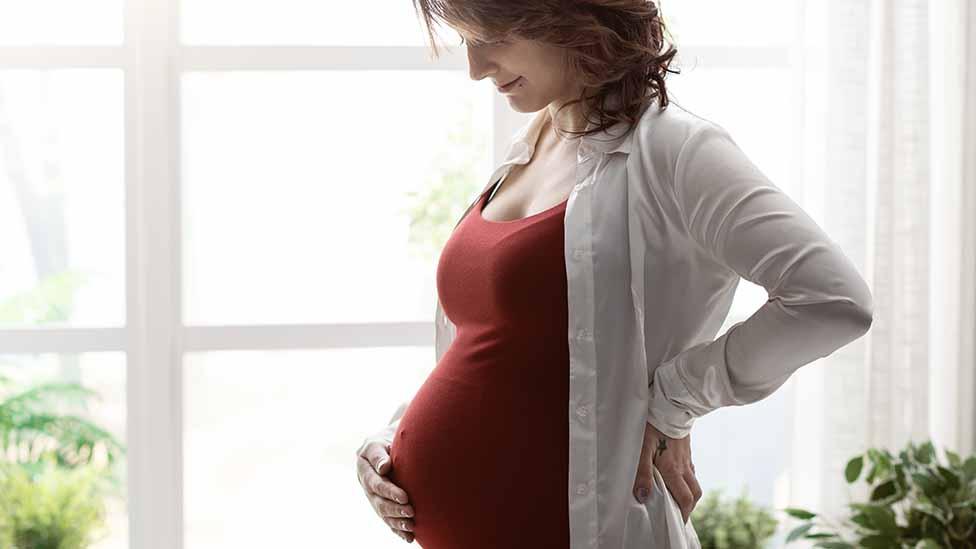Coronavirus: Risk higher for pregnant BAME women
- Published
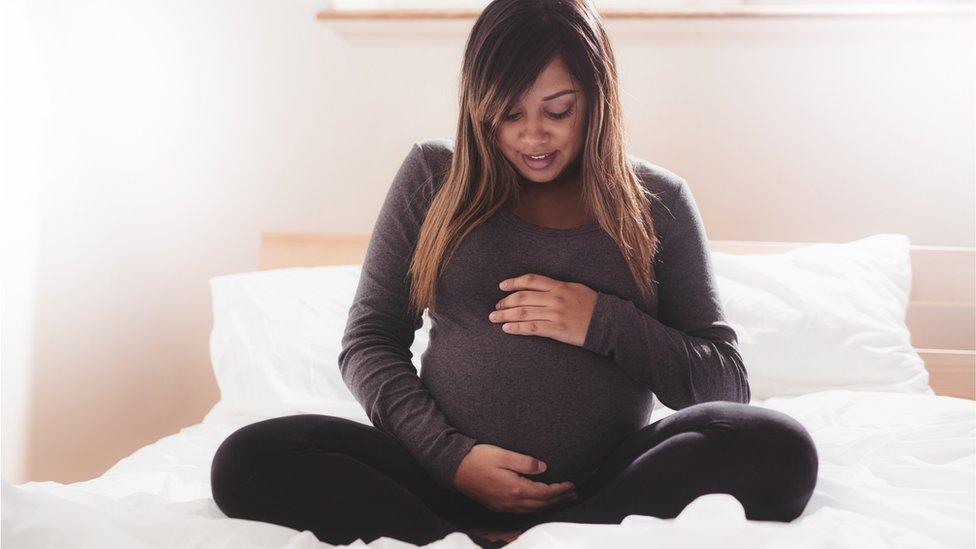
Most women were admitted late in pregnancy and did not become seriously ill
The high proportion of pregnant women from black and ethnic minority (BAME) groups admitted to hospital with Covid-19 "needs urgent investigation", says a study in the British Medical Journal.
Out of 427 pregnant women studied between March and April, more than half were from these backgrounds - nearly three times the expected number.
Most were admitted late in pregnancy and did not become seriously ill.
Although babies can be infected, the researchers said this was "uncommon".
The findings, external, based on data for pregnant women with coronavirus admitted to 194 obstetric units across the UK over six weeks, show:
56% were from black, Asian or other ethnic minority groups (25% Asian, 22% black)
70% were overweight or obese
40% were aged 35 or over
34% had underlying health conditions
In normal times, 20% of women giving birth are from black and ethnic minority backgrounds (BAME), lead author Prof Marian Knight, professor of maternal and child population health from the University of Oxford, says.
No easy explanation
When other factors such as obesity and age were taken into account, there was still a much higher proportion from ethnic minority groups than expected, the authors said.
And this was still the case when pregnant women in hospitals in big cities were excluded from the analysis.
This suggests the effect is not just down to higher infection rates in urban areas, Prof Knight said.
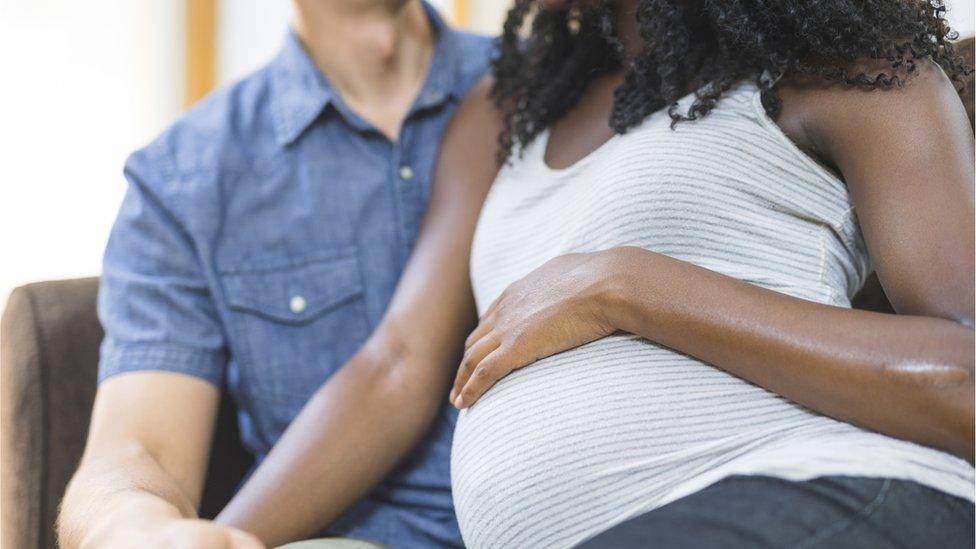
But the explanation for why BAME pregnant women are disproportionately affected by coronavirus is not simple "or easily solved", she added.
"We have to talk to women themselves, as well as health professionals, to give us more of a clue."
Prof Knight also said it was wrong to talk about BAME women as if they were all one group and all the same. Disparities could be linked to factors such as employment, multi-generational households, transport use and culture.
"Covid is the lens showing us how important disparities are," Prof Knight said.
She said women from certain communities might be less reluctant to seek help and advice early if they felt unwell.
'I hurt from top to bottom'
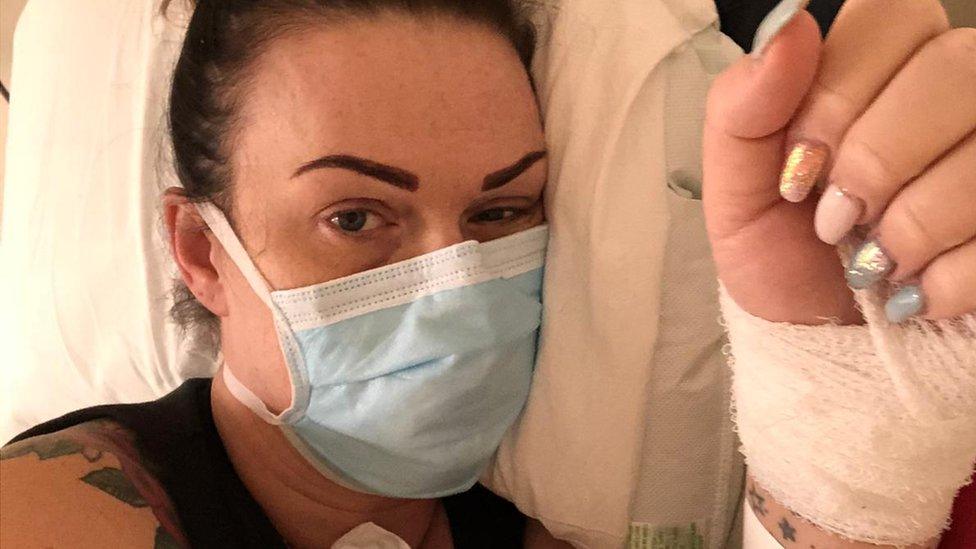
Karen Mannering tested positive for Covid-19 in March, six months into her pregnancy.
"I was so weak that I would pass out from tiredness and I would hurt from top to bottom," she explains. "I had difficulties breathing. My taste and smell vanished and still hasn't come back."
The 39-year-old from Kent developed pneumonia in both of her lungs and was hospitalised for a week. She is now preparing to be induced several weeks early.
"The fear of having coronavirus during my pregnancy is horrible" she says. "I have been so scared for my unborn baby. I'm constantly wondering if he is ok. Even in my dreams, I worry. It's always in the back of my mind.
"I recently visited the nurses who looked after me and they told me I am the only pregnant woman with coronavirus that they've treated so far. It shows how unlucky I was to catch it."
'Unacceptable risk'
Most pregnant women admitted to hospital had a fever, cough or breathlessness and were discharged to recover at home.
One in 10 of the pregnant women studied needed respiratory support in a critical care unit in hospital, while three women died as a direct result of complications from Covid-19.
The data, from the UK Obstetric Surveillance System, showed that 12 (5%) babies born to mothers in the study tested positive for Covid-19, half of them within the first 12 hours after birth, but none was seriously unwell.
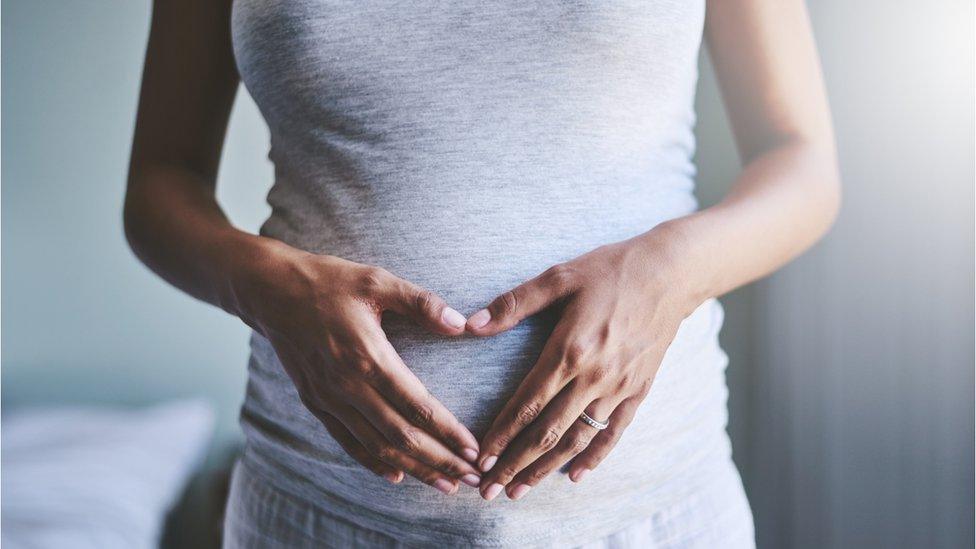
Midwives said "clear and urgent direction" was needed from the government to tackle the issue.
"Even before the pandemic, women from black, Asian or ethnic minority backgrounds were more likely to die in and around their pregnancy," Gill Walton from the Royal College of Midwives says.
She said they were "still at unacceptable risk" and getting help and support to affected communities was crucial.
The RCM has four important messages for women:
If you have a cough, are breathless or feel hot and shivery, call your midwife
Attend all your appointments - some may be by phone or video
If you are worried about your baby's movements or if you are bleeding, call your midwife immediately
Make a private space for you and your midwife during home visits
Ms Walton added: "The system is failing them and that has got to change quickly, because they matter, their lives matter and they deserve the best and safest care."

FACE MASKS: When should you wear one?
YOUR QUESTIONS: Our experts have answers
LOOK-UP TOOL: How many cases in your area?
VACCINE: How close are we to finding one?
WHAT WE DON'T KNOW How to understand the death toll

How have you been affected by any of the issues raised in this article? Tell us about your experience by emailing haveyoursay@bbc.co.uk, external.
Please include a contact number if you are willing to speak to a BBC journalist. You can also contact us in the following ways:
WhatsApp: +44 7756 165803, external
Send pictures/video to yourpics@bbc.co.uk, external
Tweet: @BBC_HaveYourSay, external
Please read our terms & conditions and privacy policy
- Published3 August 2020
